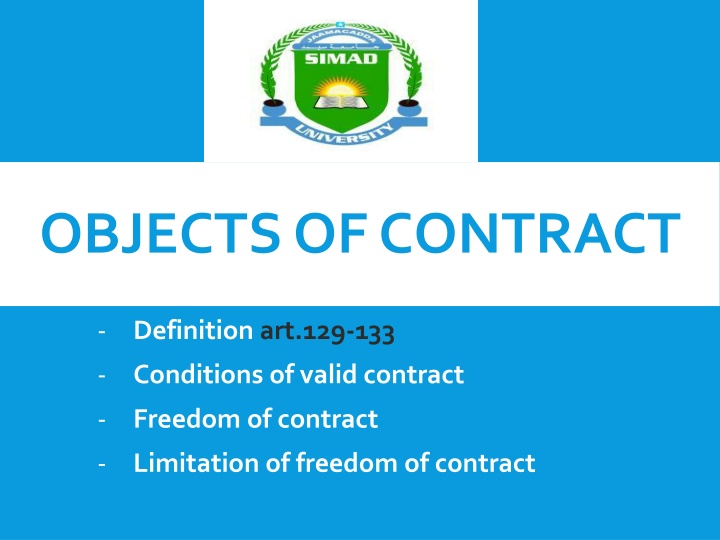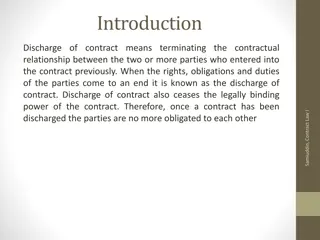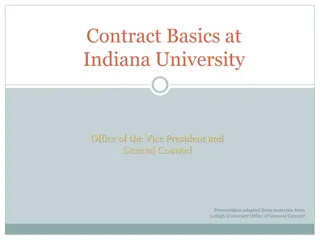
Objects of Contract, Freedom, and Limitations
Explore the definition of object in a contract, conditions for valid objects, freedom in contract agreements, and limitations to freedom due to social protection, consumer protection, and public order or morality.
Download Presentation

Please find below an Image/Link to download the presentation.
The content on the website is provided AS IS for your information and personal use only. It may not be sold, licensed, or shared on other websites without obtaining consent from the author. If you encounter any issues during the download, it is possible that the publisher has removed the file from their server.
You are allowed to download the files provided on this website for personal or commercial use, subject to the condition that they are used lawfully. All files are the property of their respective owners.
The content on the website is provided AS IS for your information and personal use only. It may not be sold, licensed, or shared on other websites without obtaining consent from the author.
E N D
Presentation Transcript
OBJECTS OF CONTRACT - Definition art.129-133 - Conditions of valid contract - Freedom of contract - Limitation of freedom of contract
DEFINITION Object of a contract is what parties have actually agreed to undertake. It is the obligation of both parties to the contract. The obligation may be to do something or to refrain from doing something or to give something to someone. So, object of a contract is the agreement of the parties to act, not to act, or to give. The object of employment contract, for example, is the employers agreement to pay wage and employees agreement to do certain thing. In contract of sale of house; the obligation of the seller is to transfer ownership and possession to the buyer and the obligation of the buyer is to pay price.
CONDITIONS OF VALID OBJECT a) Clarity of objects: the object of a contract should be sufficiently clear; otherwise the court concludes as though parties did not exercise freedom of contract b) Possibility of object: Parties freedom does not allow them to bind themselves to perform humanly impossible things. c) Legality of the object: no person can be bound by contract to violate any law of the country since such is contradiction in terms. d) Morality of Object: Therefore any immoral obligation cannot be enforced by court or executive
FREEDOM OF CONTRACT parties are the ones who define the content of their contract. They are free to determine what each party is bound to perform, where and when to perform and may also specify penalty for non performance. They are free to enter into any type of obligation, obligation to do not to do or to give . Generally parties should expressly and clearly define content of contract. On any matter which parties did not expressly agree, they are presumed to have left the matter to be governed by law, custom, equity and good faith.
LIMITATIONS TO FREEDOM OF CONTRACT However, parties freedom of contract is not absolute. No freedom on earth is absolute. Human being is a social animal where the absolute freedom of one necessarily violates freedom of another. A contractual freedom is limited to attain social justice, peaceand tranquility. The major causes for limitation of freedom of contract are: a) Social protection: laws were begun to be issue prohibiting certain types of contract and imposing terms into contract. institutions designed to act as a safety net for individuals, to protect them from extremes of commercial and industrial life.
LIMITATIONS TO FREEDOM OF CONTRACT b) Consumer protection: There has also been recognition of the danger of concentration of economic power. So legislators began to impose conditions on the parties to contract. Specially, sellers of goods were required to comply with certain basic standards. c) Public order or morality: under the guise of freedom of contract parties are not allowed to go against the public order and morality
MOTIVES OF THE PARTIES Art.134
MOTIVE Parties are expected to know content of their contract only. A party is not bound by restriction or reservation of the other party. If a party cannot be bound by restrictions and reservations of another party, equally he should not benefit from such restrictions and reservations. Moreover; motives are mostly hidden agenda of parties and knowing these motives is very difficult. In such situation allowing a part to avoid his obligation is therefore, allowing him to interfere in the private life of another contracting party in search of information and evidence necessary to prove such motive.
ILLEGAL MOTIVE The courts never invalidate a contract even if the illegal or immoral motive is clear from the contract itself. What the court should rather do is to refuse to enforce it. The court neither enforces nor invalidates the contract, the court becomes neutral towards the contract, and court rejects both claims for invalidation and enforcements of the contract.
QUESTIONS??? Comments!!!






















